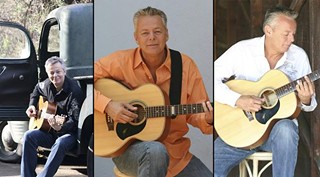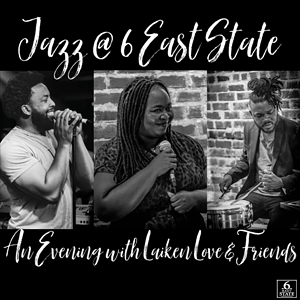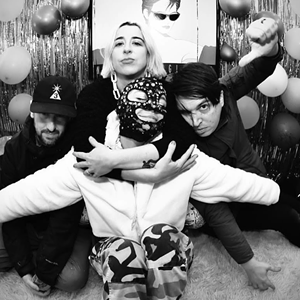The late Chet Atkins was indisputably Tommy Emmanuel’s biggest fan. “I think he’s probably the greatest finger–picker in the world today,” said the greatest finger–picker in the world (Atkins was famously humble) of his Australian protege. “He’s inventive, fearless and has a flawless sense of rhythm. He’s a great showman, too.”
Emmanuel, now based in Nashville, makes a rare appearance this weekend (both Saturday and Sunday nights) at Randy Wood Guitars in Bloomingdale.
When Atkins was impressed with another guitarist’s blazing talents, he bestowed on them the title C.G.P. (it stands for Certified Guitar Player). Not only is Emmanuel a C.G.P., he recorded a duet album with Atkins, 1997’s The Day Finger Pickers Took Over the World.
Emmanuel is — to get to the point — one of the most astonishing finger–style guitar players you’ll ever hear or see. But tickets are going fast, so if you want to get to the shows at Randy’s place, call ahead and see if there are any left.
How many fingers have you got? I’m reckoning about 26?
Tommy Emmanuel: Just the usual amount that the good Lord gave me, that’s it! He said “Here — see what you can do with those.” I’m working on it.
How long does it take to get that good?
Tommy Emmanuel: The idea is that I play a lot ‘cause I’m trying to get good. It’s different every night — some nights you reach the mark where you’re aiming at, and other nights you try as hard as you like and you never get there. If there’s something I’m doing that isn’t good enough, I work on it until it is. I’m hard to please and hard to satisfy when it comes to my own thing, you know? And you’ve got to continually try to raise the bar.
Did I read that you first came to the States in 1980?
Tommy Emmanuel: Yeah, I came here specifically to meet Chet Atkins, which was my lifelong dream. I spent all the money that I’d saved up my whole life. When I got back to Australia I had literally nothing in the bank, and nothing in my pocket. I spent every cent coming here and getting back. But it was really a great trip, and it changed my life.
In 1980, there was no Internet and no CDs. One tends to think of Chet and Merle Travis as very American musicians. Was it hard to get those records when you were coming up?
Tommy Emmanuel: It really was. It wasn’t till the mid ‘70s that you could find Chet’s records. I only found one of Merle’s records in Australia. It was a pretty early one, and it was great. By that time I’d already been totally hooked on Chet. Because I heard him the first time in 1963, and I was listening out for it everywhere I went. I’d turn the radio on hoping that someone would play it. And in 1965 a friend of mine found two albums in Sydney, and brought them up to where we lived, way out in the bush.
You have to remember that Australia was such a faraway place, and for me growing up, everything American was the best. They had the best movies, the best songs, the best guitar players. The best cars. America led the world in everything in those days.
The funny thing was, most people were incredibly jealous of America’s success. And so, if I did anything that was American – like if I played one of Chet’s tunes, or sang a Hank Williams song – people would really put that down.
And try to tell me “You’ve got to keep it Australian, and don’t try to be like those Americans.”
What I wanted to do is what I’m doing now. I already had that vision when I was a kid. I knew where I belonged, I knew what I wanted to do, I just had to figure out how the hell to get there.
So how did you go about coming here and hooking up with Chet?
Tommy Emmanuel: Here’s what happened. Just after my father died –I was 11 years old – I kind of retreated into my music a lot. I found an address on the back of one of Chet’s albums, RCA Studio B, Music Row, Nashville. I wrote a fan letter to him, and I didn’t expect him to even get it. About two months later he sent me back a letter with a photograph, signed to me. That says a lot about him in those days, this is 1966, he was probably the busiest person in Nashville. He had like 30 artists on his roster. He was the A&E director for RCA. He was single–handedly running RCA Records. He was so damn busy, but he still took time to write to a fan on the other side of the world.
And in 1980?
Tommy Emmanuel: When I was about 17, I sent him a tape of me playing. And he wrote back again and said “When you’re ready to come over here, come over. I want to meet you and I want to play with you.” I was so encouraged by that.
It wasn’t until I was 25 did I get over there, because I just had no money. I was working so hard to try and get by, and play music.
Delete - Merge Up
So when I came here in 1980, I checked into the Holiday Inn hotel down on West End. I rang his office 10 times a day. And each time his secretary would say “Mr. Atkins is in the studio” or “Mr. Atkins is in a meeting” or “Mr. Atkins is playing golf.” Three days went by before I saw him.
Meanwhile, your money’s running out ...
Tommy Emmanuel: That’s right. I don’t have much and I’m living really carefully. I’m eating down at Wendy’s. On the fourth morning, I rang about 10 a.m., and he answered the phone. I said “I’m looking for Mr. Atkins,” and he said “This is he.” I said it’s Tommy Emmanuel, from Australia. He said “Where are you?” and I said “I’m just down the road.”
He said “We’ve just been listening to you. Why don’t you come down here?” When I got there, he comes downstairs, puts his arm around me and says “You want to pick a little?”
I said “Is there a moustache in Mexico?”
There aren’t too many people around with the designation C.G.P. That must be quite an honor.
Tommy Emmanuel: It’s the greatest honor; it was Chet’s way of saying “keep going.” He had a little granny–flat out at the house, and I used to come and live there. Every morning we’d drink coffee together, and talk, and talk about his past and my future.
Our dream was that I could take finger–style music all over the world. And that’s exactly what I’m doing now. I’m playing in places where I never dreamed I would get.
For instance, last year I played in China for the first time. I got to Beijing Airport, and when I came through security there were hundreds of people. There were people with guitars. There were people holding up big banners saying “Tommy Emmanuel, Welcome to China – Finger–style Guitar Fans.” It was like Beatlemania!
The same in Shanghai, in Russia, in Croatia ... it’s like a wildfire, and it’s great.
And it’s what Chet and I talked about and dreamed about.
Is there a feeling in you that the instrument is an extension of your mind and your body?
Tommy Emmanuel: Absolutely, you hit the nail right on the head. When I pick up the guitar, them I’m complete. It was the same with Chet – I remember watching him onstage one day, and he took his guitar off and was talking to the audience. And he looked naked. He didn’t look like the complete picture until he put a guitar back on, then you went “Oh! There’s Chet.”
You’re always hoping for that magical moment where you forget about the technique, you forget about the instrument, you just think about the music and the sound and the feeling of what’s going on right now.
And you’re still discovering things?
Tommy Emmanuel: Still, absolutely. It’s bottomless. Look at how people like Segovia changed the instrument. Changed it from just a humble little thing that people strummed, and sang songs to, to this mighty, powerful thing with amazing arrangements and ideas and sounds. It’s an orchestra.
Tommy Emmanuel, C.G.P.
Where: Randy Wood Guitars, 1304 E. Highway 80, Bloomingdale
When: At 7:30 p.m. Sunday, Jan. 31 and Monday, Feb. 1
Cost: $65 (few tickets remain – call ahead)
Phone: (912) 748–1930
Online: www.randywoodguitars.com
Artist’s Web site: www.tommyemanuel.com






























